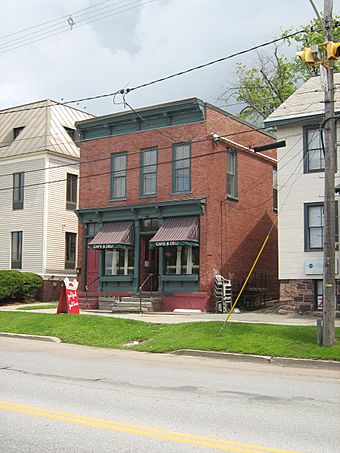Battery Street Historic District facts for kids
|
Battery Street Historic District
|
|
 |
|
| Location | Roughly bounded by Lake Champlain, Main, Maple, and St. Pauls Sts. (both sides), Burlington, Vermont |
|---|---|
| Area | 35 acres (14 ha) (original) |
| Built | 1790 |
| Architectural style | Greek Revival, Federal, Late Victorian |
| NRHP reference No. | 77000098 (original) 84003459 (increase 1) 14000451 (increase 2) |
Quick facts for kids Significant dates |
|
| Added to NRHP | November 2, 1977 |
| Boundary increases | June 28, 1984 July 24, 2014 |
The Battery Street Historic District is a special part of Burlington, Vermont. It's one of the oldest developed areas in the city. This historic district started way back in 1790.
It's located south of downtown Burlington, near Lake Champlain. This area has a mix of homes, shops, and old factories. You can see buildings from its earliest days all the way up to the 1900s. It even has one of Burlington's oldest houses!
This district was added to the National Register of Historic Places in 1977. This means it's a place recognized for its important history. The district has been made larger twice since then.
Contents
Exploring Battery Street's Past
Burlington is the biggest city in Vermont. It was officially started in 1765. People began settling there in the 1770s. But big developments were put on hold because of the American Revolutionary War.
How Burlington Grew
The area south of downtown Burlington became an important center for business early on. A man named Gideon King owned a home on King Street. This is where the city's first owners planned out the streets.
King also controlled the docks on Lake Champlain. These docks were a key spot for trade and travel. Goods moved by water, then by train, and later by trucks. This area has always been a busy hub for moving things around.
What Was Made Here?
East of King's dock and south of Main Street, many businesses popped up. There were warehouses to store goods waiting to be shipped. Small factories also opened here. They made things like paper tubes and boxes.
Burlington's only shipyard was also located on the waterfront. This is where ships were built and repaired. Areas further inland became places where people lived. Today, this historic district still has a mix of homes and businesses.
Changes to the District's Size
When the Battery Street Historic District was first listed in 1977, it covered a specific area. It stretched from Lake Champlain to St. Paul Street. It went from Main Street south to Maple Street.
In 1984, the district became much larger. It added a mostly residential area. This new part covered four city blocks. It was roughly between King, South Union, Adams, and St. Paul Streets. Then, in 2014, it grew again. This time, it included some addresses on Pine Street, south of Maple Street.



